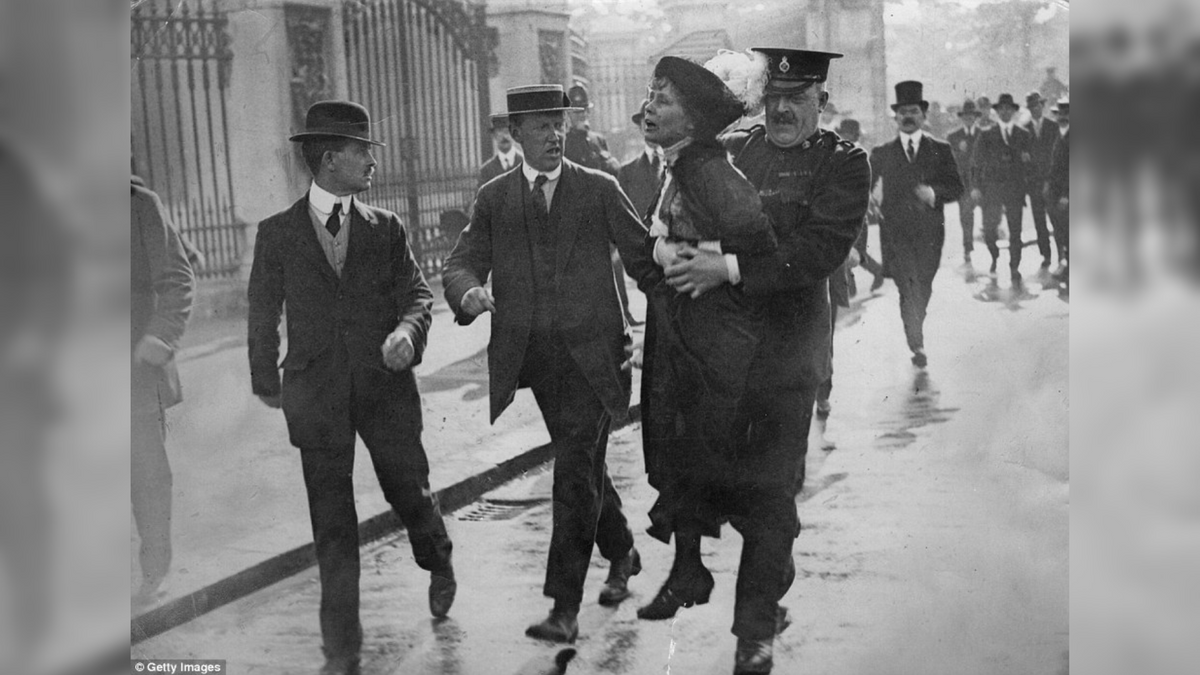Fighting Feminist Erasure With Nonviolent Disruption
The public disruption of Selina Todd's conference de-platforming is exactly what we need

Feminists are under attack. Women who dare to speak the truth, recognize material reality, and acknowledge our sex-based oppression are finding themselves #canceled from public life. We are being silenced, no-platformed, fired, attacked, slandered, and erased by a mob. Mostly, a mob of young internet warriors. Lesbians and older women are the prime targets, although, as my own cancelation demonstrates, this is not a strict rule.
In the wake of the mob, feminists have been floundering to fight back. Most women are too afraid to speak up, for fear that the mob will turn on them. Conferences, venues, workplaces, and organizations are caving to the mob because it appears to be the path of least resistance. The women who are canceled largely find themselves left behind. Private shows of sympathy are no match for the public trashing.
UK feminist campaigner, Julie Bindel, has found a way to fight back.
On Saturday, February 29th, the Oxford International Women’s Festival hosted a 50th Aniversary celebration of the first Women’s Liberation Conference, held at Oxford’s Ruskin College in 1970. Selina Todd, a Professor of Modern History at Oxford, was invited to give a brief statement during the opening ceremonies.
Todd helped organize the conference from October 2019 to February 2020, helping the group get volunteers, funding, and support. Early on, she had warned her fellow organizers that there may be opposition to her speaking. “I was then told that trans activists had already expressed hostility towards the event, she said, “because they claimed second-wave feminism is inherently trans-exclusionary.”
“However, the organisers decided that because I am a historian of feminism and working-class women, they would like to invite me, and were open to many different points of view being expressed at their event. I was delighted.”
Nonetheless, when another panelist complained about Todd speaking due to her connections with Woman’s Place UK (she recently delivered a speech at their conference), the organizers called her the evening before the anniversary celebration to tell her she was no longer welcome to speak. Ironically, her speech to Women’s Place UK was about sex discrimination in academia.
“I am disappointed at the cowardice of those who have refused to uphold our right to discuss women’s rights.”
- Prof. Selina Todd
“The organisers say this is because of pressure from trans activists and Feminist Fightback,” said Todd. “I refute the allegation that I am transphobic, and I am disappointed at the cowardice of those who have refused to uphold our right to discuss women’s rights.”
Her cancelation mirrored similar patterns of threats and harassment against conferences that give a platform to critical feminist thinkers. Recently, lesbian Youtuber Arielle Scarcella faced similar de-platforming from a women’s sexuality panel Sydney Gay Pride. I have also been removed from speaking at multiple conferences.
What made Professor Todd’s cancelation different, though, was the response it received.
Rather than send private, secretive messages of support, feminists, led by Julie Bindel, attended the very conference and demanded accountability from the organizers.
In a dramatic back-and-forth, Bindel questioned the logic of capitulating to bullies and removing feminist historians from a feminists history celebration.
“As someone who’s been de-platformed for 16 years because of this nonsense,” Bindel stated, “I’m telling you this is cowardly capitulation. We do not do this to other feminists.”
“How do you think it feels a feminist who’s advocated all her professional life, an activist all her life on behalf of disenfranchised women to be told that she is too dangerous and vile to speak?”
Organizers stated that by canceling Todd’s two-minute “thank you” speech, “our aim was to have the very least possible disruption to the conference.” Instead, they ended up facing down a 20-minute barrage of questions.
The women demanded that Professor Todd be invited back, and held a vote. The vote passed, and someone was sent to invite her to return.
Thanks to the women who spoke up at the event, the attempt to erase (literally) Professor Todd from feminist history went incredibly poorly. The celebration event closed down their Twitter page, organizers were held responsible for their harms done to women, and the parent organization, Oxford International Women’s Festival, was forced to issue a statement in support of free speech.
This tactic of disruption has long been used by civil rights campaigners throughout history, and is pretty effective in driving social change.
“I have almost reached the regrettable conclusion that the Negro's great stumbling block in the stride toward freedom is not the White Citizen's Council-er or the Ku Klux Klanner, but the white moderate who is more devoted to "order" than to justice; who prefers a negative peace which is the absence of tension to a positive peace which is the presence of justice”
- Dr. Martin Luther King Jr., "Letter from Birmingham Jail"
Martin Luther King Jr. recognized the difference between negative and positive peace. Negative peace, he wrote, “is the absence of tension”. Positive peace, on the other hand, “is the presence of justice”.
When feminists and their allies allow our sisters to be canceled, de-platformed, abused, harassed, and silenced without creating tension, we are allowing negative peace to prevail. Trans activists have been excellent at creating tension and causing disruption for their cause. No doubt, male socialization plays a role here. Women are socialized to be “peacekeepers” through reducing tension--a negative peace. Men, on the other hand, are happy to cause a scene.
There is a long feminist history of using nonviolent disruption to raise tension and force a conversation. In 1906, Emmeline and Christabel Pankhurst started disrupting political events and got themselves arrested on purpose. They used their time in jail to garner more public attention and sympathy through hunger strikes. This breaking of the negative peace, and the creation of controversy, meant that the men in power could no longer ignore the issue and were forced to address their concerns.
Bindel understood this when she disrupted the conference on behalf of Professor Todd. "Unless we speak out,” she said in a statement to 4W, “we are enabling cowards and bullies to set the agenda on women's liberation."
“We have a proud tradition as feminist campaigners of standing up for each other, and recognising that the women at the bottom of the pile are those that have to be liberated first. These are the women most vulnerable to bullying, and these are the women that have the most to lose. Unless the likes of Selina Todd, myself and others with relative privilege and public platforms speak out against this horrendous McCarthyism, the bullies will win."
Organizers, workplaces, and communities must learn that there will be consequences for caving to bullies. Nonviolent disruption, even in the form of a simple Q&A, can create tension in a space where cowards wished to avoid it.
This can’t just happen online or anonymously. Feminists and men who wish to support our cause must show up to the spaces of negative peace. Disruption is necessary to break people out of their day-to-day routine, and tension is necessary to drive the conversation forward. Since trans activists wish to limit the discussion around the issue (since they know they would lose a fair, logical debate), feminists must do the opposite. By not speaking up, by remaining silent and complacent in our own little corners, by not forcing a debate, we allow the mob to win.
"Unless we speak out, we are enabling cowards and bullies to set the agenda on women's liberation."
- Julie Bindel
Equally important is the public show of solidarity. When women are canceled, fired, and harassed for speaking up--the resulting public lack of support is isolating and terrifying. As someone who has gone through it (multiple times now), I am tired of receiving private messages of support from people who are unwilling to publicly defend me. When we allow our sisters to be disappeared without speaking up for them, we tell her that she is on her own. This is not sisterhood.
The lack of public support for canceled women also makes it less likely that future women will speak out. They see the one who has been erased, and they see the public outrage at her and the economic and social consequences she is suffering, but bystanders can not see the private messages of support she receives. Public disruption, on the other hand, demonstrates to all watching that those who are canceled are not alone. If you speak up, you will not be alone.
History has shown us that these public acts of disruption by a brave few can serve as a catalyst for change. It sparks future bravery, future acts of disruption and dissent.
In 1960, four men in Greensboro, South Carolina, sat in protest at an all-white counter. Their public act of disruption, defiance in a place of negative peace, motivated and inspired others. Soon, 70,000 people were participating in sit-ins against segregation across the country.
Feminists and our male allies who wish to end the totalitarian tactics of silencing and abuse against those who express gender-critical views must start following Bindel’s lead, and the lead of civil rights and feminist campaigners before us.
Wherever our sisters have been canceled, silenced, fired, no-platformed, harassed, and abused, we must not allow negative peace to reign in her absence. We must disrupt.
The generous support of our readers allows 4W to pay our all-female staff and over 50 writers across the globe for original articles and reporting you can’t find anywhere else. Like our work? Become a monthly donor!
Enter your email below to sign in or become a 4W member and join the conversation.
(Already did this? Try refreshing the page!)




Comments